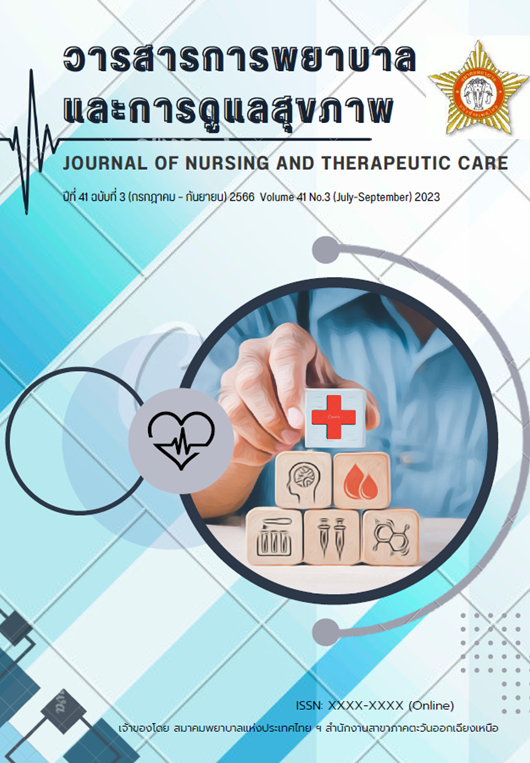ประสิทธิผลของโปรแกรมการส่งเสริมพฤติกรรมการดูแลตนเองด้วยแอพพลิเคชั่นรักใจคุณบนมือถือสำหรับผู้ป่วยภาวะหัวใจล้มเหลว
คำสำคัญ:
โปรแกรมการส่งเสริมพฤติกรรมการดูแลตนเอง, แอพพลิเคชั่นบนมือถือ, ภาวะหัวใจล้มเหลว, การกลับมานอนรักษาในโรงพยาบาลซ้ำบทคัดย่อ
การวิจัยครั้งนี้เป็นการวิจัยกึ่งทดลอง ศึกษาหนึ่งกลุ่มวัดผลก่อนและหลังการทดลอง มีวัตถุประสงค์เพื่อศึกษาประสิทธิผล ของโปรแกรมการส่งเสริมพฤติกรรมการดูแลตนเองด้วยแอพพลิเคชั่นรักใจคุณบนมือถือ ต่อ พฤติกรรมการดูแลตนเอง การรับรู้เกี่ยวกับภาวะหัวใจล้มเหลว คุณภาพชีวิต และการกลับมานอนรักษาในโรงพยาบาลซ้ำของผู้ป่วยภาวะหัวใจล้มเหลว กลุ่มตัวอย่างเป็นผู้ป่วยภาวะหัวใจล้มเหลว จำนวน 32 ราย เลือกกลุ่มตัวอย่างโดยการสุ่มอย่างง่าย เครื่องมือที่ใช้ในการดำเนินการทดลอง คือ โปรแกรมการส่งเสริมพฤติกรรมการดูแลตนเองด้วยแอพพลิเคชั่นรักใจคุณบนมือถือ และเครื่องมือที่ใช้ในการเก็บรวบรวมข้อมูล ประกอบด้วย แบบสอบถามข้อมูลส่วนบุคคล แบบสอบถามพฤติกรรมการดูแลตนเองในผู้ป่วยภาวะหัวใจล้มเหลว แบบสอบถามการรับรู้เกี่ยวกับภาวะหัวใจล้มเหลว แบบประเมินคุณภาพชีวิตของผู้ป่วยภาวะหัวใจล้มเหลว และแบบบันทึกการกลับมานอนรักษาในโรงพยาบาลซ้ำของผู้ป่วยภาวะหัวใจล้มเหลว โดยแบบสอบถามแต่ละชุดมีค่าดัชนีความตรงตามเนื้อหา เท่ากับ 0.95, 0.70 และ 0.94 ตามลำดับ และมีค่าความเชื่อมั่น เท่ากับ 0.85, 0.97 และ 0.82 ตามลำดับ วิเคราะห์ข้อมูลโดยใช้สถิติเชิงพรรณาและสถิต Paired T-Test
ผลการวิจัย พบว่า หลังการใช้โปรแกรมการส่งเสริมพฤติกรรมการดูแลตนเองด้วยแอพพลิเคชั่นรักใจคุณบนมือถือกลุ่มตัวอย่างมีพฤติกรรมการดูแลตนเอง มีการรับรู้เกี่ยวกับภาวะหัวใจล้มเหลว และมีคุณภาพชีวิตอยู่ในระดับที่เพิ่มสูงขึ้น และมีการกลับมานอนรักษาในโรงพยาบาลซ้ำลดลง อย่างมีนัยสําคัญทางสถิติ (p < .001) ผลการศึกษาแสดงให้เห็นควรนำโปรแกรมการส่งเสริมพฤติกรรมการดูแลตนเองด้วยแอพพลิเคชั่นรักใจคุณบนมือถือมาใช้กับผู้ป่วยภาวะหัวใจล้มเหลว เพื่อเพิ่มคุณภาพการดูแลผู้ป่วยกลุ่มนี้
Downloads
เอกสารอ้างอิง
Ministry of Public Health. Strategy and Planning Division [Internet]. 2010 [cited 2023 Jan 05]. Available from: http://www.pcko.moph.go.th
The Heart Association of Thailand under the Royal Patronage of H.M. the King, Heart Failure Society of Thailand. Guidelines for Diagnosis and Treatment of Heart Failure, 2014. Bangkok: A-Plus Printing; 2014. (in Thai)
Heart Failure Council of Thailand. Heart Failure Council of Thailand (HFCT) 2019 Heart Failure Guideline. Bangkok: Next Step Design; 2019. (in Thai)
World Health Organization. Major cardiovascular study shows substantial regional differences [Internet]. 2010 [cited 2023 Jan 2]. Available from: http://WHO.int/topic/cardiovasculardiseases/en.
Maharak C. Outcomes of patients admitted with heart failure at Phang Nga Hospital. Medical Journal. 2019;33(2):311-26. (in Thai)
Kobkuechaiyapong S. Characteristics of heart failure patients readmitted within 28 days in Saraburi Hospital. The Journal of Prapokklao Hospital Clinical Medical Education Center. 2013;30(1):35-46. (in Thai)
Department of Medical Records and Statistics. Annual statistical report 2023. Lopburi: Medical Statistics Reporting Unit, Medical Records and Statistics King-Narai Hospital; 2023. (in Thai)
Jaarsma T, Hill L, Bayes-Genis A, Rocca B, Castiello T, Strömberg A, et al. Self-care of heart failure patients: Practical management recommendations from the heart failure association of the european society of cardiology. Eur J Cardiovasc Nurs. 2021;23(1):157-74.
Fisher JD, Fisher WA. Changing AIDS-risk behavior. Psychol Bull. 1992;111(3):455-74.
Brahmbhatt DH, Cowie MR. Remote management of heart failure: An overview of telemonitoring technologies. CFR journal 2019;5(2):86-92.
Athilingam P, Jenkins B, Johansson M, Labrador M. A mobile health intervention to improve self-care in patients with heart failure: Pilot randomized control trial. J Med Internet Res Cardio. 2017;1(2):112-20.
Glide Application. Innovation treasury [Internet]. 2023 [cited 2023 Jan 2] Available from: https://eduvator.lpru.ac.th/glide-application (in Thai)
Antonello C, Barbara R, Fabio D, Gennaro R, Roberta F, Rosaria A. Describing self-care in Italian adults with heart failure and identifying determinants of poor self-care. Eur J Cardiovasc Nurs. 2015;14(2):126-36.
Tawalbeh LL, Qadire MA, Ahmad MM, Aloush S, Sumaqa YA, Halabi M. Knowledge and self-care behaviors among patients with heart failure in Jordan. Res nurs health journal. 2017;40:350–9.
Teeoutid W, Kunsongkeit W, Dungpaeng S. Factor influencing self-management behaviors of sodium restriction among congestive heart failure patients. Journal of Boromarajonani College of Nursing, Bangkok. 2019;35(1):120-9. (in Thai)
Norwood SL. Research strategies for advanced practice nurse. Upper Saddle River, New Jersey: Prentice Hall; 2000.
Dsudthironapoom P. The effects of self-care promoting program on self-care behaviors and quality of life among patients with heart failure in Prachuapkhirikhan Hospital. The Journal of Cardio-Thoracic Nursing. 2015;26(1):2-14. (in Thai)
Suwanno J, Petsirasan R, Prasearttha P, Chanpradi A, Saisu W. Age and heart failure self-care: A comparison of self-care maintenance between eldery and adults. Songklanagarind medical journal 2009 ;27(4): 335-46. (in Thai)
Mechusin J. Factors related to perceived severity of heart failure in patients with heart failure. The Journal of Faculty of Nursing Burapha University; 2015. (in Thai)
Krethong, P. A Causal model of health-related quality of life in Thai patients with heart-failure. J Nurs Scholarsh 2008;40(3):254-60. (in Thai)
Reid B, Kathryn R, Jill H, Craig T, Virginia R, Kimone R, et al. Using video education to improve outcomes in heart failure. J Am Heart Assoc 2019;48(5):386-94.
Jeon E, Park HA. Experiences of patients with a diabetes self-care app developed based on the information-motivation-behavioral skills model: before-and-after study. JMIR Diabetes. 2019;4(2):159-214.
Aamodt IT, Ina T, Edita L, Jelena C, Thomas L, Dan A, et al. Self-care monitoring of heart failure symptoms and lung impedance at home following hospital discharge: Longitudinal study. J Med Internet Res 2020; 22(1):145-219.
Jintana P, Sriyuktasuth A, Pongthavornkamol K, Nata N. Information-motivation-behavioral skills program improved phosphate binder adherence in patients with chronic hemodialysis. Journal of Nursing Science 2016;34(2):92-101. (in Thai)
Polhan B, Wattanakitkrileart D, Pongthavornkamol K. The effects of education and inhaler skills program through line application on symptom control among asthmatic patient. The Journal of The Royal Thai Army Nurses 2019;20(3):93-103. (in Thai)
Wang KX, Qiu JB, Ju Y, Chen GC, Yang JH, Pang JH, et al. Reduction of heart failure rehospitalization using a weight management education intervention. J Cardiovasc Nurs 2014;29(6):528-34.
ดาวน์โหลด
เผยแพร่แล้ว
รูปแบบการอ้างอิง
ฉบับ
ประเภทบทความ
สัญญาอนุญาต
ลิขสิทธิ์ (c) 2023 วารสารการพยาบาลและการดูแลสุขภาพ

อนุญาตภายใต้เงื่อนไข Creative Commons Attribution-NonCommercial-NoDerivatives 4.0 International License.



